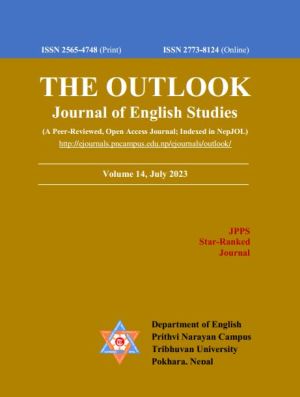From Sensibility to Sublimity: Worshipping Land Community in Pearl S. Buck’s The Good Earth
DOI:
https://doi.org/10.3126/ojes.v14i1.56663Keywords:
Eco-centric, ecological sensibility, ecological sublimity, biophiliaAbstract
This paper explores and analyses the kind of ecological sublimity the protagonist goes through despite poverty and significant modern development in China in Pearl S. Buck’s The Good Earth (1931) from an eco-critical perspective. Wang Lung, the protagonist, experienced wonderful transformations in China during his lifetime. The colonization, arrival of Christian missionaries, urbanization and construction of a railroad signal modernity in China. However, Lung feels ecological sublimity despite the ups and downs brought about by the series of transformations in China. The paper draws on ideas from the eco-critical insights anticipated by Aldo Leopold and E. O. Wilson. As a qualitative applied research, the focus lies on Leopold's concept of “land community” and Wilson’s idea of “biophilia”. Ecological sensibility is the only way to feel the earth’s community’s bliss even during modern development. The reverence for land community unbelievably renders the vibration of ecological sublimity. It provides spiritual freedom to people of all classes, religions and nationalities from around the world. In this sense, the land community offers sublime happiness in the world if we stop coveting its domain.
Downloads
Downloads
Published
How to Cite
Issue
Section
License

This work is licensed under a Creative Commons Attribution-NonCommercial 4.0 International License.
This license enables reusers to distribute, remix, adapt, and build upon the material in any medium or format for noncommercial purposes only, and only so long as attribution is given to the creator.

